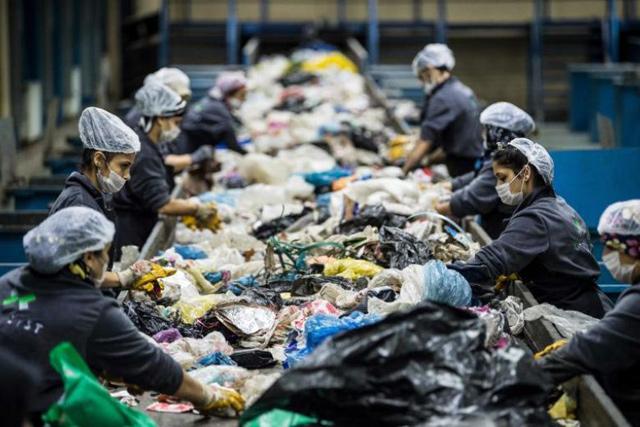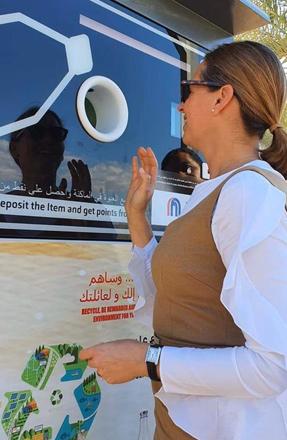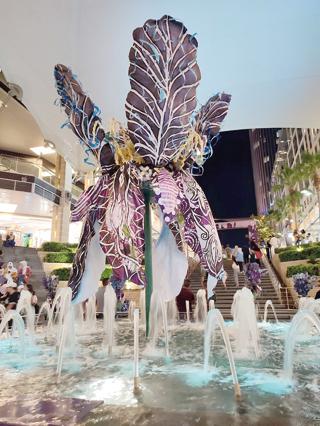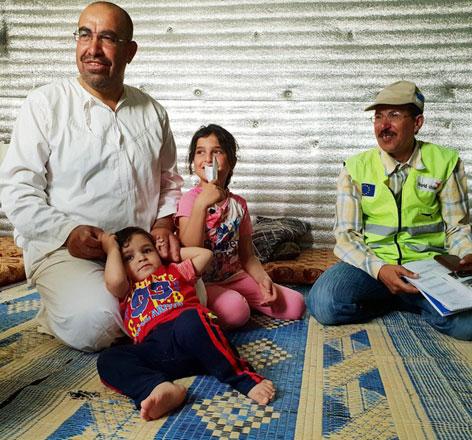You are here
Slow recycler Turkey seeks better uses for its trash
By AFP - Dec 09,2018 - Last updated at Dec 09,2018

Turkish workers eliminate garbage in the recycling centre in Istanbul on November 14. The country of over 80 million people has notoriously bad record on recycling and waste. Activists say this needs to change fast and there are signs, albeit tentative, the authorities are starting to understand the need to change the public's profligate habits (AFP photo)
ISTANBUL — Turkish woman Tulay Gercek stands in front of a vending machine at a busy Istanbul metro station but instead of putting coins into a slot, she crams plastic bottles into a hole.
Every bottle or can Gercek places in the machine gives extra credit on her Istanbul card — the universal ticket for using public transport in the city — in a pilot project by the municipality to promote recycling.
"I'm bringing plastic bottles every day," she said at Sishane station, where she had brought a large bag of bottles and cans.
"In the past I used to throw them into the bin. This is a very good project. There should be more," she said. "I believe it will help raise public awareness a little bit."
The machines are in place at three metro stations in Turkey's mega city and officials hope to expand to more in the future.
It is so far a relatively rare step in a country of over 80 million people with a notoriously bad record on recycling and waste.
Activists say this must change fast and there are signs, albeit tentative, that the authorities are starting to understand the need to change profligate habits.
'Polluting the soil'
Turkey ranks 108th with a score of 52.96 in the 2018 Environmental Performance Index (EPI), produced by the Yale Centre for Environmental Law and Policy, that analyses the environmental performance of 180 nations.
Top of the eco-chart is Switzerland, with a score of 87.42, indicating a strong showing across most issues, especially climate, energy and air pollution.
Oya Guzel, of the Mind Your Waste (Copune Sahip Cik) foundation, said Turkey was producing around 31 million tonnes of waste annually, out of which 11 per cent was recycled.
"We are polluting the soil and the environment with plastics, metals and glass which remain in the natural environment for years," she told AFP.
"We have a target of 35 per cent [of all waste to be recycled] by five years from now, which is also low but we believe progress can be made" in that time.
She said it was consumers in the end who have to decide what is recyclable.
"We could turn it into raw material, or throw away litter and make it trash," Guzel said, urging consumers to give up on disposable materials.
"We use a plastic bag for an average time of 12 minutes. It becomes trash 12 minutes later."
The Istanbul municipality told AFP that, of the non-recycled waste, 61 per cent was burned to produce electricity and the remaining 28 per cent buried with no use.
End to free bags
Green policies do not appear as yet to be a major vote winner in Turkey but there are signs the ruling Justice and Development Party (AKP) of President Recep Tayyip Erdogan is now paying some attention to the issue.
Environment and Urbanisation Minister Murat Kurum said there would be a compulsory charge for plastic bags from January, bringing Turkey into line with other European countries.
That would be a revolution in a country which uses plastic bags massively.
Kurum said that every Turkish citizen uses, on average, 440 bags a year, adding the aim was to reduce this to 40 by 2025.
The recycling campaign is also strongly backed by Erdogan's wife Emine, who said at a conference on zero waste that the target was a "more liveable environment" and a "stronger economy by classifying the waste at its source and recycling".
She said Erdogan's presidential palace was leading the way with its staff now trained in how to recycle waste on site.
"We have not had garbage trucks at the presidential complex for a long time," she said.
'Will get better'
At a sorting facility on the outskirts of Istanbul, organic waste is separated, processed and used as fertiliser in parks and gardens throughout the city, while non-organic materials, like glass, plastics and metals, are recycled.
But Ibrahim Halil Turkeri, the city's recycling chief, said that "greater responsibility falls to individuals".
"If the waste is classified at its source, cleaner waste will reach our facility and factories, and they will have better value as secondary raw materials, and all will have been recycled."
Ahmet Hamdi Zembil, environment engineer at waste management company ISTAC, said gas from burning organic waste can be transformed into electricity.
But he added that classifying at source was crucial so that synthetic waste was not mixed in.
"We have disposed of 7 million tonnes of waste here over the last year and produced 400 million kilowatt hours of electricity," he said.
Back at Sishane, Gercek slotted her plastic bottles into the machine, realising to her chagrin that only 0.03 lira is given for each can or bottle, meaning she would need to recycle 87 cans or bottles for a single free trip that normally costs 2.60 lira ($0.50).
"But still, it is a start. I believe this system will get better," she said
Related Articles
AMMAN — The Royal Marine Conservation Society of Jordan (JREDS) on Saturday installed “ground-breaking” recycling machines for marine litter
AMMAN — Environmental artist Maria Nissan is fighting against single-use plastics in Jordan by turning plastic waste into art. In colla
AMMAN — A Green Centre in the middle of Jordan's desert is leading the way in the fight against pollution in the Kingdom, with refugees from




















